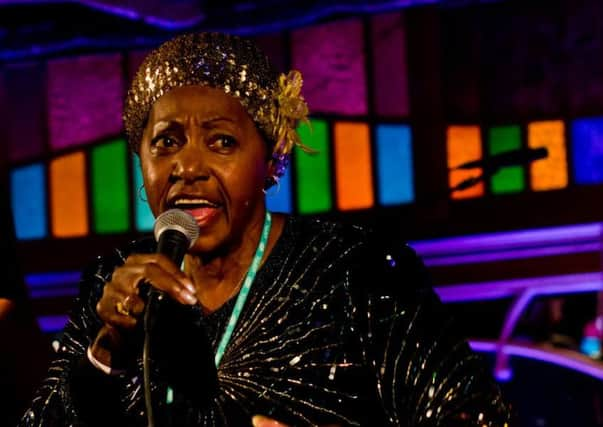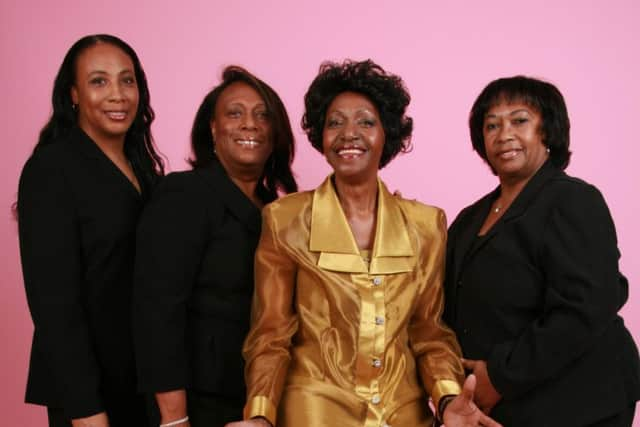Naomi Shelton on jazz, gospel and keeping the faith


IN THE peerless jazz documentary Jazz On A Summer’s Day, calm descends on the closing moments of the 1958 Newport Jazz Festival when the original gospel queen Mahalia Jackson takes the stage. But when her modern-day successor, Naomi Shelton, performs on the opening night of the 2015 Edinburgh Jazz Festival, the St Andrew Square Spiegeltent crowd will undoubtedly be looking for more of a party spirit from the show being headlined by the gravelly-voiced Daptone Records star.
Shelton, who is 72-years-old, only has two albums to her credit, since she only landed her recording contract six years ago, when she was already a senior citizen. She may have been a late starter on the recording front but her name was already near-legendary on the soul circuit, and she had been singing professionally for decades.
Advertisement
Hide AdBorn and raised on a farm on the outskirts of the small town of Midway, Alabama, the young Shelton began singing in her local wood-frame Baptist church at the age of six.


“All the family sang,” she recalls. “I grew up with four brothers and two sisters and we all sang in church. It played a big part in my life and kept us very busy as children.”
Shelton may have grown up in the segregated south during the period in which the Civil Rights movement blossomed, but racism wasn’t a subject that was much discussed in the family home. “My dad was an architect and he was amongst all kinds of people – he travelled all over. But in my home we didn’t talk about racism; we only talked about the goodness of the Lord and how people should love one another and treat one another. We knew it was there but we didn’t dwell on it. You’re very aware of it, you’re aware of a whole lot of stuff, but it don’t mean you have to carry it in your heart.”
But wasn’t it prevalent in the local community – or was it not too bad because it was a small town? “It wasn’t too bad where we lived – everybody in that neighbourhood was family, relatives, and everybody got along with each other. It was a small community; it would have been a sad thing to not get along when you ain’t got enough people to have a fight with!”
As “the Davis Sisters of Midway”, Shelton sang the gospel repertoire in public throughout her adolescence with her older siblings, Hattie Mae and Annie Ruth. They performed in churches across the region, at Baptist conferences and in a regular radio slot. “My dad helped build the studio on Tuskegee Highway and we would broadcast every Sunday morning at 6 o’clock and then we would come back home and have our breakfast and get ready for church.”
Aged 17, Shelton left high school and followed one of her sisters to New York, where she immediately began hitting the nightclubs in search of gigs. But she had to abandon the search on that occasion. “My mom got sick so I went back to Alabama for a while till she got better, then I went to Miami, Florida, as my sister had gone there, having decided that she didn’t like New York. That’s where my daughter Joanne was born, when I was 17. I was there for a good year or two, but I left because there wasn’t enough money to be made there in my book. You had to have two or three jobs to make a decent living, so I came back. And New York is where I’ve been since 1960.”
Advertisement
Hide AdIn 1963, Shelton – who counts Sam Cooke and Otis Redding as her favourite singers (“I identify with the male singers because I was never one of those sweet singers”) – became the house singer at the celebrated Night Cap club in Brooklyn, a nightly residency that put her on the soul music map. By the time she stood in front of the microphone each evening she would often already have done two cleaning or housekeeping jobs that day. It must have been a hard life.
“Well, I was very, very blessed: my parents raised my daughter for me in Alabama so I was a free agent to go and do what I had to do, and I wanted to work. I was fortunate and blessed that my mom and dad raised my daughter and that meant that I was free to work and send money home to take care of her. My two brothers were still at home then – so everybody in the family pitched in and helped out.
Advertisement
Hide Ad“It was hard to be separated, but you do what you have to do. You get the job done, you have to take care of your obligations. I don’t complain about my life. I’ve had some ups and downs, but all those humps and bumps help to keep you on the straight path.”
Even during the hard times, she felt it would all come right. Why? “Because I always held on to my dreams. Like I said in the song, A Change Is Gonna Come, I knew that one day change would come. I knew that my God, He ain’t forgot about me. He’s going to push me somewhere too.”
But what was her dream? To make a record? To be famous? “No. My dream was just to sing and get out there and touch people – that’s what it’s all about. It’s not about being famous or how much money I could make. It’s about showing love and being able to reach out. It’s all about love, whether you sing gospel, R&B. But I call my music soul music, because if it’s soul music you can touch any soul out there – from all walks of life, and that’s it. It’s rooted in gospel music. But if you can touch people’s souls then you say, ‘Lord I thank you.’ That’s what my ministry is all about. Everybody needs to know that He will give you strength and help you pursue the positive side of life.”
How did she feel when, in 2009, she finally got to make her first album, What Have You Done, My Brother? “It was great, but you know the best thing was that I was still around to watch the dream come true. A lot of people don’t see the dream come true. So I was grateful to God that He allowed me to still be around.
“I never got frustrated that it didn’t happen sooner. I’m not that much into myself, I didn’t do this by myself; it was God that allowed me to do this. I don’t want to get caught up in this ‘I’m famous, I’m a star, I’m a big-time diva.’ No, that’s not me. That’s not my cup of tea at all. If it was meant for it to happen years ago it would have happened, but at that time God wasn’t ready for me because I had a lot of baggage that I had to clean up, so He helped me get rid of all the baggage – all the negative stuff I had been carrying for years. We have to let go of the baggage so we can move to the next level of life. So He said: ‘You’ve got some cleaning up to do then I’ll be able to place you some place’ – and that’s what He did. And you know, that’s why I’m ever so grateful each day of my life. ‘One day at a time’, that’s my theory – for everything in life.”
So, what should the Edinburgh audience expect from her show? “Just tell them to expect let’s have a good time, a hallelujah good time!” n
Twitter: @girlfridayjazz
• Naomi Shelton & the Gospel Queens play the Spiegeltent St Andrew Square on Friday, www.edinburghjazzfestival.com